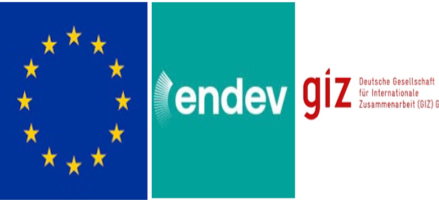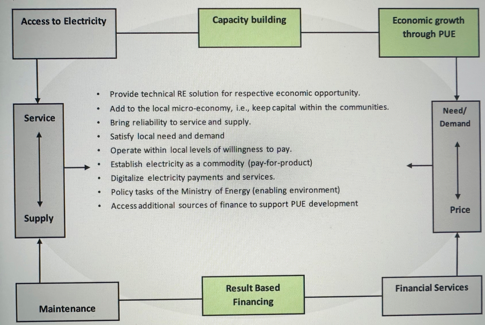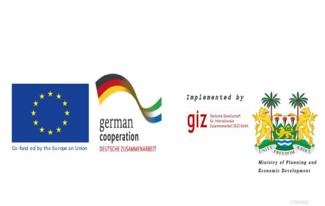
ENERGIZING DEVELOPMENT PROGRAMME – SIERRA LEONE
CALL FOR EXPRESSION OF INTEREST (EOI) CONSULTANCY SUPPORT SERVICES TO ENDEV FOR THE BASELINE SURVEY OF TRANSFORMATIONAL ENERGY USE FOR SIERRA LEONE (TEUSL) PHASE 1
PROJECT N0: 14.2275.7-215.00
COSOFT NUMBER:83444504
Background
EnDev:
The Action “Transformational Energy Use for Sierra Leone – Phase 1” (TEUSL 1) is a multi-donor action jointly co-financed by the European Union and the German Federal Ministry for Economic Cooperation and Development, BMZ and implemented by GIZ as a contribution to the multi-donor initiative Energising Development (EnDev), which is also financed by the Netherlands Ministry of Foreign Affairs, the Norwegian Ministry of Foreign Affairs (NORAD), the German Federal Ministry for Economic Cooperation and Development, and the Swiss Agency for Development and Cooperation (SDC). Energising Development (EnDev) is active in Sierra Leone since 2014.
TEUSL1:
TEUSL 1 contributes to the Specific Objective (Outcome 2) of the EU-Action “Transformational Energy Access for Sierra Leone (TEASL)”. The Overall Objective of TEASL is “to contribute to increased generation and access to modern, sustainable, affordable and reliable energy for jobs and growth” in an economically sustainable manner.
TEUSL 1 is implemented regionally in priority pilot locations around existing mini grids with a focus on the districts Kenema and Kono, aiming to identify, formulate and test promotional approaches for entrepreneurially most promising usage of off-grid RE-electricity. A hand-over period is foreseen for beneficiaries. A second phase, TEUSL 2, offers the up scaling of the pilot results under TEUSL 1 and is expected to multiply impact observed here.
TEUSL 1 specific objective is broken down into three outputs:
- Output 1: Solutions for the use of renewable energy are developed and accessible for households, MSMEs and public services. Focusing on the main agricultural value chains of the pilot regions, the objective is to improve the economy through an increase of household and MSME income.
- Output 2: Skills and competencies of the labour force and businesses are enhanced. Sustainable economic development through measures under output 1 are strengthened through skills development on the demand- as well as on the supply-side.
Output 3: Availability of sustainable financial services for accessing renewable energies is increased. Existing Village Savings, Loans Associations (VLSAs) and other relevant institutions are strengthened where already existing, introduced where missing
Objective of Assignment
The overall objective of the baseline survey is to generate baseline information in as to what aspects outlined in the project approach above are in which location available, which ones need to be developed and which ones offer the best opportunity to kick-start economic activity (low-hanging-fruits). The result of the study should be a catalogue or map of economic conditions that can indicate a preferred approach and location to kick-start PUE. This result will be used to
- Provide a benchmark for project monitoring and evaluation. The information will be used to track progress towards achieving the expected results and outcomes of the Action
- Build a living database for reporting
- Further inform the interventions and strategies of the Action, to be better synchronized to local economic realities
- Help to outline the overall strategy in terms of initial starting location and beneficiaries
- Identify overall economic potential and technically feasible productive use of energy (PUE) solutions for the agricultural sector
- It will be used to fine-tuning of activities, and
- Deliver key-indicators for the selection of grant-recipients
Overall approach of the Action TEUSL1:
In its overall approach, TEUSL (1 and 2) looks at understanding the linkage between economic performance and access to energy as a circular set-up that needs to function in all its aspects to create a sustainable and economically viable productive use of electricity (see graph below). This approach assumes that in many areas key aspects for an economically viable PUE are already available; however, one or more key aspects are missing to allow for a self-sustaining development of PUE results and thus instigate economic growth.
| Provide technical RE solution for respective economic opportunity.Add to the local micro-economy, i.e., keep capital within the communities.Bring reliability to service and supply.Satisfy local need and demandOperate within local levels of willingness to pay.Establish electricity as a commodity (pay-for-product)Digitalize electricity payments and services.Policy tasks of the Ministry of Energy (enabling environment)Access additional sources of finance to support PUE development |
The Consultant will work under the direct supervision of the EnDev Director for Sierra Leone, Mr. Karl Segschneider. The baseline survey will establish a socio-economic database for the Kenema/Kono region in communities with and without access to micro- or mini grids. It will survey economic potential and technically feasible solutions for PUE of the targeted stakeholders with a focus on agricultural value chains. Specific tasks are:
- to review existing demographic information and socio-economic data of the targeted population and stakeholders, select relevant data and make them accessible for analysis
- to collect missing relevant demographic information and socio-economic data of the targeted population and stakeholders (households, MSMEs)
- to identify the most viable, economic potential and technically feasible PUE solutions in the pilot regions
- to evaluate existing and functional business models (including technical data, financial data and information on financing) for PUE solutions for different industrial categories of the rural economy (primary industries, light manufacturing, and commercial and retail enterprises) with a focus on agricultural value chains in order to be able to develop replicable business cases
- to collect and analyze data on existing not (yet totally) functional business models for the different industrial categories and with a focus on agricultural value chains in order to identify the missing requirements that can lead to an increased use of PUE and household and MSME income
- inside mini-grid areas: to identify where the connection to the mini-grid can lead to an increased household and MSME income
- outside mini-grid areas: to identify where the introduction of stand-alone PV-systems can lead to an increased household and MSME income
- to identify, where financing needs are a major barrier for the successful PUE
Specific tasks II
EnDev programming July 2023 to June 2025 offers a new range of supportive instruments from the Dutch consortium partner. These are addressing the following areas:
- SME Finance Facilitator, i.e., a guarantor scheme/subsidy platform.
- Innovation Fund for up-scaling activities
- Carbon Credit Facilities, to assist in activities looking at the carbon credit markets
- Enabling Environment for policy support, which can pay for studies on policy related issues
In this context, the study is expected to outline in which way the TEUSL1 project can benefit from linking up with these new respective EnDev tools to increase the actions impact on promoting economically viable PUE.
Specific tasks II
EnDev programming July 2023 to June 2025 offers a new range of supportive instruments from the Dutch consortium partner. These are addressing the following areas:
- SME Finance Facilitator, i.e., a guarantor scheme/subsidy platform.
- Innovation Fund for up-scaling activities
- Carbon Credit Facilities, to assist in activities looking at the carbon credit markets
- Enabling Environment for policy support, which can pay for studies on policy related issues
In this context, the study is expected to outline in which way the TEUSL1 project can benefit from linking up with these new respective EnDev tools to increase the actions impact on promoting economically viable PUE.
Key deliverables
- Inception report including work plan detailing on survey methods, planned phases of data collection and timing
- Design a baseline for the TEUSL1 action for the socio-economic context as outline, here.
- Methodology and questionnaire for socio-economic data collection in Kenema and Kono region
- Methodology and questionnaire for qualitative data collection (interviews, focus group discussions)
- Database with collected quantitative and qualitative data
- Final baseline survey with analysis of data and recommendations for
- the most viable, economic potential and technically feasible PUE solutions, and
- for missing requirements (financing, electrification through RE, technical trainings, awareness raising of PU appliances etc.) in the existing value chains to improve the economy in the pilot regions
- direction and opportunity for up scaling the described value chain
- Propose terms for a follow-up study indicated by results of this study
Methodology
Below is the main methodology to be used for the baseline assessment:
- Both primary and secondary sources of information will be used to generate baseline data and information.
- Both qualitative and quantitative methods of data collection in order all the information needed for the project is collected.
- Information on households and MSMEs will be collected with digital software to collect, analyze, and manage data (only with data analysis software accepted under terms and conditions of both GIZ and the EU).
- Additional qualitative information will be collected through interviews and focus group discussions with the relevant stakeholders (such as Agricultural Business Centres (ABCs), farmers, MSMEs).
Area and extent covered by the study
Area: Kono and Kenema regions of Eastern province
Extent: As the rainy season is currently approaching, the physical range of the study is limited to areas that can be accessed within 1 day of travel in the rainy season
Organisation, Roles, and Responsibility
The consultancy will be contracted by and report to Deutsche Gesellschaft für Internationale Zusammenarbeit (GIZ)/Energising Development Sierra Leone. The EnDev team will provide any necessary available documents and information needed as far as available. EnDev will be responsible for the following:
- Approve inception report
- Provide input into the tools developed, and
- Provide input into the baseline design
- Provide consultants with literature review materials/necessary documentations where available
- Link consultant to relevant stakeholders
Terms and Conditions
The consultant will come up with his/her own rate which will be subject to negotiation within the bounds of donor requirements and set standards of Deutsche Gesellschaft für Internationale Zusammenarbeit (GIZ). In providing services to EnDev, the Consultant shall be acting as an independent contractor and not as an employee of the organization. The Consultant, therefore, has no actual or implied authority to commit or obligate EnDev in any manner whatsoever without prior approval of its Director for Sierra Leone and Liberia. The Consultant can subcontract local professionals and data collectors to deliver on the ToR.
The consultant shall propose a local team that includes:
- Lead consultant (international)
- IT and statistics specialist (local)
- Specialist for agricultural value chains (local)
- Specialist on socio-economic aspects (local)
- An engineer on RE for electricity (local)
Also Proposed Payment Modality
The payment of the Consultant for his/her services will be made after the submission of all deliverables. The locally work-related infrastructure, including transportation/IT, will be provided by the project in Sierra Leone.
Travel and other expenses (as lump sums)
Travel cost and accommodation expenditure within Sierra Leone will be borne by the Consultant as a lumpsum amount within the project budget. All accommodation expenditures are based on evidence.
Note: The reports should be submitted in English.
Implementation time frame
Duration of assignment
The submission date for the inception report shall be expected within 15 working days beginning upon award of contract. The submission date for the final baseline survey and the collected data shall be 50 working days upon award of contract.
Eligibility criteria and documents to be submitted by the enterprise
- Experience in Sierra Leone in the renewable energy sector. With over 5 years of track record
- Experience in mini-grids and productive use, preferably in Sierra Leone
- Master’s degree in electronic or preferably renewable energy studies
- Technical expertise in the productive use of energy
- Existing network in the Sierra Leone energy sector
- Working experience in the private sector for renewable energies, preferable in Sierra Leone
- Knowledge of the Sierra Leone context, including the energy sector, social, economic, and political dynamics.
- Experience in conducting feasibility studies, project planning in the energy sector and rural development context.
- Solid methodological and research skill
- Proficiency in quantitative and qualitative data collection and analysis techniques.
- Fluency in English language
- Strong report writing and presentation skills
- Familiarity with EU project implementation is an advantage
- Submission condition
- Proof of good standing, commercial qualification, payment of taxes and social benefits: Clearance certificate of NRA and NASSIT
- Based and registered in Sierra Leone: Valid certificate of Business Registration.
- One page on the proposed work plan for the assignment (including timeline) and implementation concept note
- One page about the enterprise and all contact details (1 page, max. 600words)
The CVs of the personnel proposed for the assignment
Submission of Expressions of Interest
Consulting Firms should submit their “Expression of Interest” to the below email address
not later than 7th August 2023, 5:00 PM local time with the subject “EOI Application for BASELINE SURVEY TEUSL PHASE 1” – “COSOFT NUMBER 83444504”
Submission should not exceed two pages (excluding copies of documents) using font and font size of Arial and 11 respectively, at line spacing 1.15.
For any questions, contact sl_enquiry@giz.de with the subject “EoI Application for Baseline Survey TEUSL – Phase 1” – “COSOFT NUMBER 83444504” not later than 3rd August 2023.
Only prequalified interested enterprises will be contacted with a template for detailed elaboration of the proposal. However, a brief profile that details your experiences in similar partnership will be required (see “Submission condition” above).




